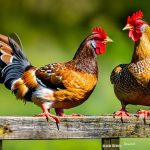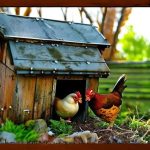Keeping ducks and chickens together in a coop is a popular practice among backyard poultry enthusiasts. It offers several benefits, such as increased egg production and pest control. However, there are also considerations to keep in mind before introducing ducks to your chicken coop. In this article, we will explore the benefits and considerations of keeping ducks and chickens together, as well as provide tips on how to successfully integrate them into one coop.
Key Takeaways
- Keeping ducks and chickens together can provide a range of benefits, including pest control, increased egg production, and entertainment.
- Before introducing ducks to your chicken coop, it’s important to consider factors such as space, water access, and potential health risks.
- Choosing the right duck breed is crucial for successful integration with chickens, as some breeds are more docile and adaptable than others.
- The top 5 duck breeds to keep with chickens include the Khaki Campbell, Runner, Buff, Swedish, and Welsh Harlequin.
- Housing and feeding requirements for ducks and chickens differ, so it’s important to provide separate areas for each species and offer appropriate food and water sources.
Benefits of Keeping Ducks and Chickens Together
One of the main benefits of keeping ducks and chickens together is increased egg production. Ducks are known for their high egg-laying capabilities, and when they are housed with chickens, they can inspire the hens to lay more eggs as well. This can be especially beneficial for those who are looking to have a steady supply of fresh eggs.
Another benefit of keeping ducks and chickens together is pest control. Ducks are natural foragers and love to eat insects, slugs, and snails. By allowing them to roam freely in your yard or garden, they can help control pests that may damage your plants or crops. Chickens also contribute to pest control by eating bugs and insects, making them a great team when it comes to keeping your backyard pest-free.
Personal experiences or anecdotes can make the post more relatable. For example, one poultry enthusiast shared how her egg production increased significantly after introducing ducks to her chicken coop. She also noticed a decrease in pests in her garden, thanks to the combined efforts of her ducks and chickens.
Considerations Before Introducing Ducks to Your Chicken Coop
Before introducing ducks to your chicken coop, there are several considerations to keep in mind. First, you need to assess the size of your coop and the number of birds you have. Ducks require more space than chickens due to their larger size and different behaviors. It’s important to ensure that there is enough room for both species to move around comfortably.
Another consideration is the need for separate areas for ducks and chickens. Ducks can be more aggressive than chickens, and they may bully or fight with the smaller birds. To prevent this, it’s important to provide separate areas within the coop where ducks and chickens can retreat to if needed. This will help maintain peace and harmony among the flock.
The Importance of Choosing the Right Duck Breed
When keeping ducks and chickens together, it’s important to choose the right duck breed. Different duck breeds have different temperaments and needs, so it’s crucial to select a breed that is compatible with your chickens. Some duck breeds are known to be more docile and get along well with other poultry, while others may be more aggressive or territorial.
Researching different duck breeds and their characteristics can help you make an informed decision. For example, Muscovy ducks are known for their calm and friendly nature, making them a good choice for cohabitation with chickens. On the other hand, Mallard ducks can be more aggressive and may not be suitable for keeping with chickens.
Top 5 Duck Breeds to Keep with Chickens
Here are the top 5 duck breeds that are known to get along well with chickens:
1. Muscovy Ducks: Muscovy ducks are known for their calm and friendly nature. They are also excellent foragers and can help control pests in your yard or garden.
2. Khaki Campbell Ducks: Khaki Campbell ducks are highly productive egg layers, making them a popular choice for backyard poultry enthusiasts. They are also known to be docile and get along well with other poultry.
3. Indian Runner Ducks: Indian Runner ducks are known for their upright posture and unique walking style. They are excellent foragers and can help control pests in your backyard.
4. Welsh Harlequin Ducks: Welsh Harlequin ducks are a relatively new breed but have gained popularity due to their friendly and calm nature. They are also good egg layers and can cohabitate well with chickens.
5. Pekin Ducks: Pekin ducks are one of the most popular duck breeds for backyard poultry keeping. They are friendly, docile, and get along well with other poultry.
Housing Requirements for Ducks and Chickens

When housing ducks and chickens together, it’s important to consider their specific housing requirements. Both species require nesting boxes for laying eggs and roosting areas for resting at night. However, ducks have different needs when it comes to water access.
Ducks need access to water for swimming and cleaning themselves. Therefore, it’s important to provide a shallow pool or pond within the coop or in the yard where they can fulfill this need. Chickens, on the other hand, do not require water for swimming but should have access to clean drinking water at all times.
Adequate space is also crucial when housing ducks and chickens together. Ducks require more space than chickens due to their larger size and different behaviors. It’s important to provide enough room for both species to move around comfortably without feeling overcrowded.
Feeding Requirements for Ducks and Chickens
Ducks and chickens have different dietary needs, so it’s important to provide appropriate feed for each species. Chickens require a balanced diet that consists of grains, protein, vitamins, and minerals. There are commercially available chicken feeds that meet these requirements.
Ducks, on the other hand, have higher protein requirements than chickens, especially during their growing phase and egg-laying period. It’s important to provide a feed specifically formulated for ducks or supplement their diet with additional protein sources such as insects or mealworms.
Feeding both species together can be done without any issues by providing separate feeding areas within the coop or yard. This will prevent competition between ducks and chickens and ensure that each species gets the appropriate nutrition they need.
Health Concerns When Keeping Ducks and Chickens Together
When keeping ducks and chickens together, there are potential health concerns to be aware of. One of the main risks is the transmission of diseases between the two species. Ducks can carry diseases such as avian influenza or duck viral enteritis, which can be transmitted to chickens.
To minimize the risk of disease transmission, it’s important to keep the coop clean and provide proper veterinary care for both ducks and chickens. Regular cleaning and disinfection of the coop, as well as monitoring the health of the birds, can help prevent the spread of diseases.
Tips for Introducing Ducks to Your Chicken Flock
Introducing ducks to your chicken flock should be done gradually to minimize stress and prevent any potential conflicts. Here are some tips for a successful introduction:
1. Provide separate areas: Before introducing ducks, provide separate areas within the coop where they can retreat to if needed. This will help prevent bullying or fighting between ducks and chickens.
2. Gradual introduction: Start by allowing the ducks and chickens to see each other through a wire mesh or fence. This will allow them to get used to each other’s presence without direct contact.
3. Supervise interactions: When you feel that the birds are comfortable with each other, you can allow supervised interactions. Monitor their behavior closely and intervene if any aggression or bullying occurs.
4. Make adjustments as needed: If any conflicts arise, make adjustments to the setup or provide additional space for each species. It may take some time for them to establish a pecking order and get used to each other’s presence.
Enjoying the Best of Both Worlds with Ducks and Chickens in Your Coop
Keeping ducks and chickens together in a coop can offer several benefits, such as increased egg production and pest control. However, it’s important to consider the size of your coop, provide separate areas for each species, and choose the right duck breed for compatibility.
By following the tips and considerations mentioned in this article, you can successfully introduce ducks to your chicken flock and enjoy the best of both worlds. With proper care, housing, and feeding, you can create a harmonious environment where ducks and chickens thrive together. So why not give it a try and enjoy the benefits of having both species in your backyard?
If you’re considering keeping ducks and chickens together, it’s important to choose the right duck breed that will coexist harmoniously with your flock. In order to make an informed decision, it’s helpful to understand the characteristics and behaviors of different duck breeds. Poultry Wizard has a great article on the best duck breed to keep with chickens, which provides valuable insights and recommendations. Check out their article here to learn more about finding the perfect duck breed for your chicken coop.
FAQs
What are the best duck breeds to keep with chickens?
There are several duck breeds that can be kept with chickens, including the Khaki Campbell, Runner, and Buff Orpington.
What are the benefits of keeping ducks with chickens?
Keeping ducks with chickens can provide several benefits, including increased pest control, improved soil health, and a more diverse and interesting flock.
What are some considerations when keeping ducks with chickens?
When keeping ducks with chickens, it is important to consider the size and temperament of the birds, as well as their dietary needs and housing requirements.
Do ducks and chickens get along?
Ducks and chickens can get along well if introduced properly and given enough space and resources. However, there may be some territorial behavior and occasional squabbles.
What should I feed my ducks and chickens?
Ducks and chickens have different dietary needs, so it is important to provide them with separate feeders and appropriate feed. Ducks require a higher protein content and more niacin than chickens.
What kind of housing do ducks and chickens need?
Ducks and chickens require different types of housing. Chickens need a coop with nesting boxes and roosting bars, while ducks need a sheltered area with access to water for swimming and cleaning.
Can ducks and chickens share a water source?
Ducks and chickens can share a water source, but it is important to provide enough space and resources to prevent overcrowding and ensure that all birds have access to clean water.
Meet Walter, the feathered-friend fanatic of Florida! Nestled in the sunshine state, Walter struts through life with his feathered companions, clucking his way to happiness. With a coop that’s fancier than a five-star hotel, he’s the Don Juan of the chicken world. When he’s not teaching his hens to do the cha-cha, you’ll find him in a heated debate with his prized rooster, Sir Clucks-a-Lot. Walter’s poultry passion is no yolk; he’s the sunny-side-up guy you never knew you needed in your flock of friends!







